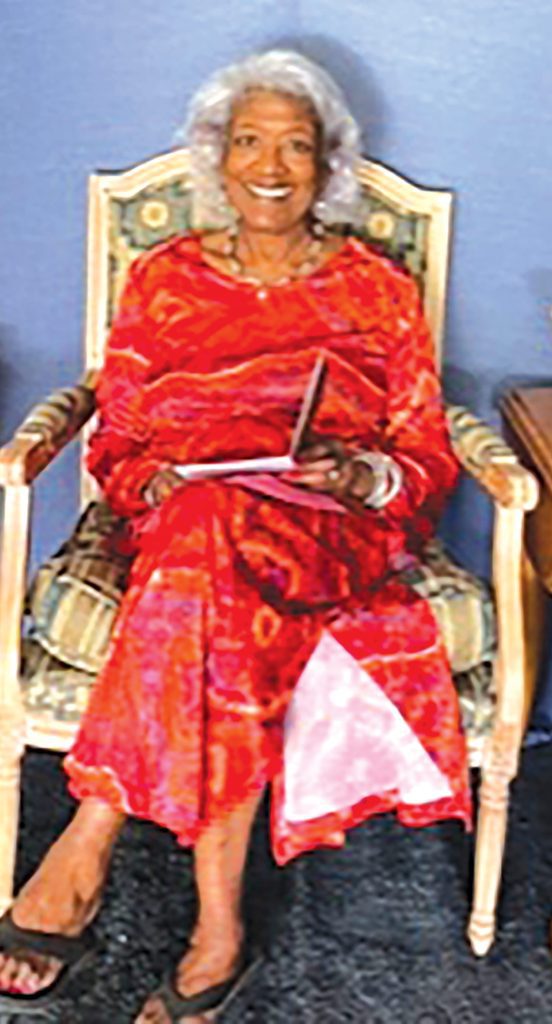
Dora D. Robinson Remembered for Her Leadership, Passion
A Legacy of Caring, Getting Involved

Dora D. Robinson
It’s been more than 30 years since the incident just outside the Martin Luther King Jr. Community Center in Springfield, but Nate Johnson says he won’t ever forget what happened that Halloween afternoon.
Or the woman who committed what he described not as an act of kindness, but rather as “heroism.”
A group of teenagers had gathered outside the MLK Center, he recalled, and a fight broke out among them — a “real fight.”
He was in the middle of it, he said, adding that, from seemingly out of nowhere, Dora D. Robinson, the director at the center, grabbed him and pulled him out of the fracas.
To this day, he doesn’t know why she picked him from among all the others. He’s just grateful she did, because that was simply the beginning of her influence on his life.
“She’s my superhero that came to rescue me,” he said, making a point to use the present tense, adding that Robinson, who passed away last month at age 71, essentially “adopted” him at that point and became a mother figure, mentor, inspiration, and someone who helped open doors and compel him to walk through them.
Opening doors and guiding people through them … that might be a concise yet effective way to at least start to sum up a remarkable life and career in public service that included a lengthy stint at the MLK Center, a tenure as president and CEO of the United Way of Pioneer Valley (UWPV), and many other leadership roles.
But her passion for serving the community, creating opportunities for others, and battling social injustice continued long after she formally retired, said those who knew and worked with her.
Indeed, Helen Caulton-Harris, commissioner of the Division of Health and Human Services in Springfield, who worked with Robinson on a number of initiatives and was her close friend, remembers that, just a few days before she fell ill, Robinson was working on a maternal health program in Indian Orchard and had called her asking if she would write a support letter so Robinson could secure funding for the initiative.
“Dora started her life in Elmira, New York, but Springfield was her heart and soul,” Caulton-Harris said. “She put everything she had into this community. Her leadership was critical. Even after she retired from her formal job, she still felt her passion to be a leader and to make sure she was creating opportunities and leaving a legacy of supporting nonprofits.”
Donna Haghighat, CEO of the Women’s Fund of Western Massachusetts, agreed. She said Robinson chaired one of the committees setting up the agency’s Young Women’s Initiative, one of many endeavors she was passionate about.
“She felt strongly about empowering young women of color,” Haghighat noted, adding that she eventually convinced Robinson to join her board. “What was compelling to her was that this initiative was mentoring young women of color, teaching them about philanthropy, which was very close to her heart. They learned about nonprofits that were doing work in the areas that they identified as barriers to their own prosperity in Springfield. So it was a wonderful way to learn that philanthropy can be a tool of social justice.”
Robinson learned that lesson early on in her career, and one of her many passions, said those we spoke with, was to impart that lesson on others.
For this issue and its focus on women in business, we reflect on the life and career of Dora D. Robinson, who certainly was an influential woman in business, with her business being the community she lived and worked in and her tireless efforts to bring about equity and opportunities for everyone.
Passion Play
Born in Elmira, Robinson made a lifetime commitment to social and racial justice starting with her participation in the Poor People’s March on Washington as a teenager in 1968.
She earned a bachelor’s degree from Cornell University, completed graduate studies at Smith College, and earned a master’s degree in social work from the University of Connecticut.
She put those degrees to use in a number of leadership roles with area nonprofits and on countless boards. She served as vice president of Education at the Urban League of Springfield and corporate director and vice president of Child and Family Services at the Center for Human Development.
“She understood her responsibility to mentor and nurture and create pathways for future leaders. She understood the need to give young Black individuals, as well as seasoned individuals, an opportunity for growth. She knew she held a unique responsibility to make sure there were others in our community who followed us.”
Starting in 1991, she served as the inaugural leader of the Martin Luther King Jr. Community Center and as a member of the MLK Community Presbyterian Church, and actively supported the Project Mustard Seed campaign to raise funds to build a community center to serve as a place for youth and family in the Mason Square neighborhood to thrive. Nearly two decades later, she had established MLK Jr. Family Services, a multi-service agency with a $3 million operating budget, 75 full- and part-time employees, and more than 100 volunteers with services delivered at three program sites located across Greater Springfield.
Robinson took the helm at the UWPV in 2009 as the first woman to serve as its CEO. Under her leadership, the agency launched several new strategies to diversify revenues contributing to education, homelessness initiatives, basic needs, and financial-security programs. She also led the founding of the UWPV Women’s Leadership Council (now renamed the Dora D. Robinson Women’s Leadership Council in her honor) to engage local women leaders in supporting financial literacy and health initiatives for women and girls.
She retired from the United Way in 2017 but continued to work on passion projects, including the Indian Orchard Citizen’s Council, the Black Behavioral Health Network, and many others.
Over the years, she served in a number of regional, state, and national leadership roles with groups including the Springfield Regional Chamber, the Springfield Library Foundation, the Federal Reserve Bank of Boston community advisory board, Springfield Technical Community College, and as a founding member of the Healing Racism Institute of Pioneer Valley.
Beyond all these lines on a résumé, Robinson is remembered for her boundless passion for the region and especially its underserved, her sense of humor, as well as her willingness to donate her time, money, and leadership to innumerable causes and organizations in this region and well beyond. She is remembered as a dynamic, forward-thinking administrator who led by example and was able to inspire others.
“As an administrator, Dora Robinson was strategic, and to me, that was one of her greatest strengths,” Caulton-Harris said. “She looked at the lanes of her administration, of her leadership, and she was very strategic about who she interacted with and how she interacted.”
Elaborating, she said Robinson understood the role she played as a Black woman in leadership roles and embraced all that came with it.
“She understood her responsibility to mentor and nurture and create pathways for future leaders. She understood the need to give young Black individuals, as well as seasoned individuals, an opportunity for growth. She knew she held a unique responsibility to make sure there were others in our community who followed us.
“Dora had a spirit that could not be harnessed. She was an explosive force of love everywhere she went; everyone she interacted with felt that generosity of spirit,” Caulton-Harris continued. “I think her legacy is one of warmth, almost like the warmth of the sun — her rays sort of permeated everything she interacted with.”
Johnson concurred, and said that, to him, Robinson was a more than leader in the boardroom. She was a leader on the streets of Springfield — in his case, quite literally.
“I’m thankful and grateful for her,” he said. “She treated me like I was her son. She stayed with me for the past 30 years, and I stayed with her. And she’s still with me.”
Caulton-Harris agreed, and then spoke for everyone who knew Robinson when she said, “frankly, I’m not sure how I move forward without her. I’ll miss her.”
Lasting Legacy
As he talked about Robinson, her legacy, and her influence on him, Nate Johnson said use of the past tense simply won’t cut it.
She remains a large and powerful force in his life and how he lives it, and always will be, he said, adding that the lessons she imparted, the example she set, and her directive to keep reaching higher and find new ways to make the most of his life, while also making a difference in the lives of others, will not only stay with him, but guide him for the rest of his life.
And there are countless people across the region who can, and do, say the same thing.
That’s the kind of impact reserved for superheroes.




